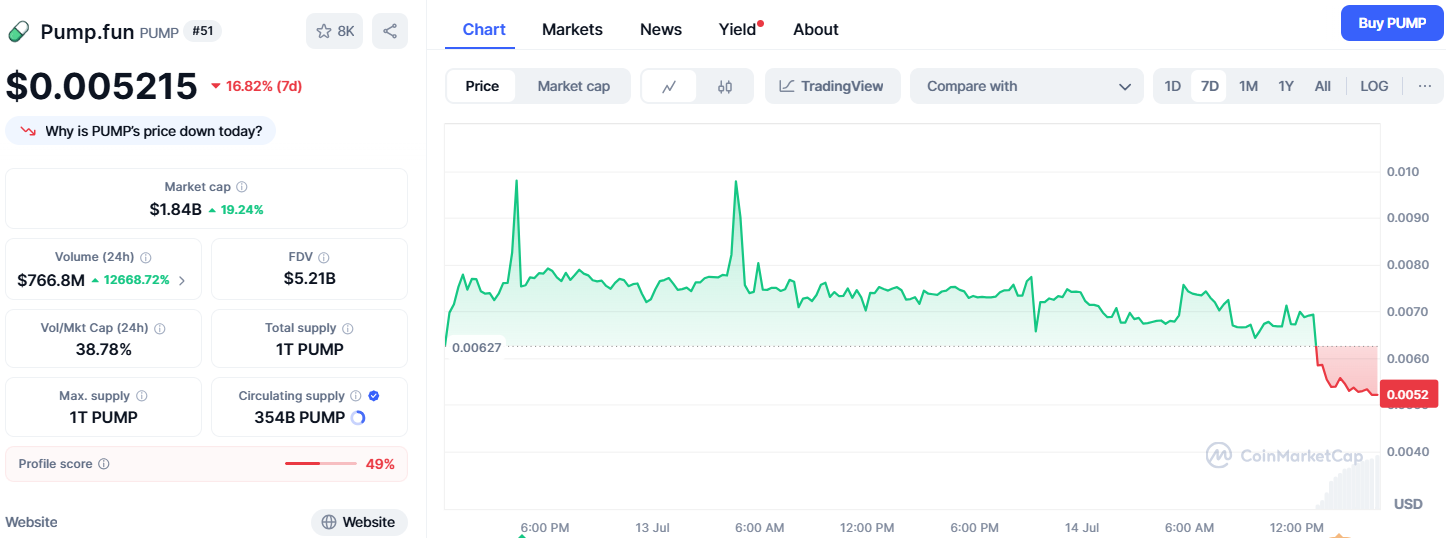Will it Pump or Will it Dump? Pump.fun’s Legendary $500M Token Raise
By Matthew Mousa, Director Strategy & Research
Twelve minutes. That’s how long it took for the public portion of a half-billion-dollar sale to conclude.
The event was the initial coin offering for pump.fun, the chaotic and wildly profitable engine of the Solana ecosystem. While the sale itself was a multi-day affair, the public allocation was gone in a flash. This wasn't just another token launch; it was a pivotal moment for internet capital markets. The sheer anticipation was palpable weeks in advance. In a rare move for an asset that wasn't even transferable yet, perpetual futures for PUMP went live on platforms like Hyperliquid, quickly accumulating over $65 million in open interest. It was a clear signal of intense speculative demand, a market hungry to price in the future of Solana's flagship application.
The structure of the sale itself was a hybrid of old and new. A significant portion was allocated to a private sale for institutional investors, with the remainder offered to the public on identical terms. The ICO was hosted on several major exchanges, a nod to traditional distribution, yet it explicitly excluded U.S. and U.K. investors, highlighting the complex regulatory dance that even the most decentralized projects must now perform.
This model stands in stark contrast to the long march toward a Wall Street IPO. For internet-native businesses with verifiable on-chain metrics and a large, engaged user base, the traditional path may no longer be the only, or even the best, option. Why spend months on a roadshow, shuffling between boardrooms in New York and London, only to pay hefty fees to investment banks? We are entering an era where a project's community is its most potent source of capital, and a token launch is the most direct way to galvanize it. For investors, the implications are profound. The skillset required is shifting from analyzing S-1 filings to interpreting on-chain data, from gauging Wall Street sentiment to parsing Discord and X chatter.
The consensus view is to marvel at the speed. The more nuanced take, however, is to recognize this as a critical test of a platform at a crossroads. While pump.fun has enjoyed a near-monopoly on memecoin creation, accumulating over $800 million in fees since its 2024 inception, the landscape is rapidly changing. The market is now asking a critical question: is this a durable, community-aligned protocol, or a brilliantly executed founder cash-out?
This question has gained urgency with the stunning rise of a competitor, bonk.fun. According to a recent analysis by Galaxy Research, the rival launchpad, though only a few months old, recently surpassed pump.fun in both daily tokens launched and 24-hour volume. The reason for this shift is disarmingly simple: better economics for users. Bonk.fun directs half its fees to buy and burn its native BONK token, creating a virtuous cycle where platform usage directly translates to token value. This has resonated with the market, with top launches on bonk.fun achieving valuations an order of magnitude higher than recent hits on pump.fun.
This competitive pressure exposes a raw nerve for pump.fun: its reputation for being extractive. The platform has long faced criticism for its opaque value distribution and for consistently selling massive amounts of SOL, creating the perception that it is draining liquidity from the very ecosystem it helped build. The PUMP token launch is the team's opportunity to rewrite that narrative. A planned airdrop, potentially valued at nearly $1 billion based on the 24% "community and ecosystem" allocation, is a crucial first step. Yet, airdrops are fleeting. The real test will be whether the token can provide sustained value.
Here, the picture remains troublingly vague. While there have been anonymously sourced reports of a 25% revenue share for token holders, the official details are minimal. It’s unclear if this would apply to the platform’s massive pre-existing treasury or only future revenue, and the mechanics of any buyback or distribution are undefined. For an application that has consistently generated tens of millions in monthly revenue, this lack of clarity is a significant concern for any long-term investor.
The path forward for pump.fun involves navigating these existential threats. It must prove that it can innovate beyond its initial success. One major initiative is a push into the creator economy, allocating a portion of its token supply to support livestreamers. It's an ambitious bet on SocialFi, a sector littered with failed projects that struggled to create sustainable token models for creators and fans. If pump.fun can solve this puzzle, it could unlock a powerful new growth vector.
The key catalyst to watch for projects like this are no longer analyst upgrades but protocol revenue growth and the implementation of value-accrual mechanisms. The primary risk marker is not a disappointing earnings call but the brutal, reflexive nature of a market that operates 24/7 with no circuit breakers, combined with the platform's ability to transition from a perceived extractor of value to a creator of it. The success of the PUMP token will ultimately depend on whether its founders can convince the market that they are building a long-term, equitable ecosystem, not just taking an early and lucrative exit. The throne is no longer guaranteed.
Resources:
https://www.galaxy.com/insights/research/weekly-top-stories-7-11-25
https://www.ledger.com/academy/crypto/what-is-pump-fun-and-how-does-it-work
Matthew Mousa is Director of Strategy and Research at Alpha Transform Holdings, where he drives insights at the intersection of blockchain, crypto, and AI. He’s also the host of the Alpha Liquid Podcast, spotlighting innovators and trends shaping the digital asset landscape. With a background in investment banking and portfolio valuation, Mousa brings a sharp, strategic lens to emerging technologies and market dynamics. Follow Mousa on X and LinkedIn.
©Alpha Transform Holdings | Disclaimer | Privacy Policy









